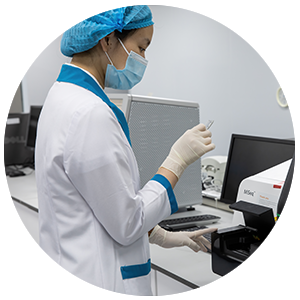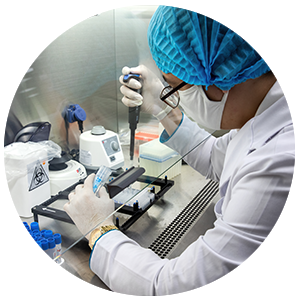Genome research and applications are playing an irreplaceably important role in fighting the pandemic. And this year's breakthroughs will continue to improve human health against more than just Covid. Below are some of our achievements in the field of genetics.
- GLOBAL GENETIC EPIDEMIOLOGY SEEMED KEY TO FIGHTING COVID-19 AND FUTURE PANDEMICS
- DEVELOPING COUNTRIES EMERGE AS LEADERS IN GENETIC ISSUES BUT EQUITY IN HEALTH ACCESS IS A MAJOR ISSUE OF CONCERN
- GENE-RELATED MEDICAL THERAPY EMERGES AS ONE OF THE MAJOR THERAPY
- DEPLOYING BREAKTHROUGH LIQUID BIOPSY TEST TO HELP DETECT MULTIPLE CANCER EARLY OVER 50 TYPES OF CANCER
- COMPENSATION FOR GENETIC TESTS EXPANDS TO 1 BILLION PEOPLE GLOBALLY
COVID-19 has caused terrible damage in 2021, claiming more than 3.5 million lives, more than the combined losses caused by HIV/AIDS, tuberculosis and malaria. We will never be able to forget the consequences, the loss and the pain it caused. But, 2021 also marked and recognized countless heroic acts, and most of the great breakthroughs in the medical field were driven by the pressure of the need to fight epidemics.
.
GLOBAL GENETIC EPIDEMIOLOGY SEEMED KEY TO FIGHTING COVID-19 AND FUTURE PANDEMICS
Britain has implemented COVID-19 genomic surveillance since mid-2020. The rapid spread of the Delta variant at the end of 2020 raised alarm bells globally. The world began following Britain's lead and conducting a review of virus genome research this year, and nearly 200 countries sequenced and shared data on more than 6.6 million SARS-CoV-2 virus genomes in 2021.
.
This global assessment of genomics and epidemiology is already providing us with many benefits, even after the pandemic. These are early systematic warnings for us in the fight against similar future pandemics – animal-borne Coronavirus mutations, antibiotic resistance or bioterrorism attacks. learn. Comprehensive genomic research and surveillance help us understand if the technologies we currently have to fight epidemics - vaccines, tests and therapies - are effective or not for people. new variants, understanding more about the transmissibility of strains, providing information to develop better public policies. We cannot rule out future pandemics like this, but together we can end COVID-19.
.
DEVELOPING COUNTRIES EMERGE AS LEADERS IN GENETIC ISSUES BUT EQUITY IN HEALTH ACCESS IS A MAJOR ISSUE OF CONCERN
Spurred by the pandemic, many developing countries have built and expanded genome sequencing laboratories, increasing sequencing capacity in South Africa and training scientists about genetic studies across Africa.
.
Developing countries are key in assessing the genome of the COVID-19 virus. Teams in Botswana and South Africa were the first to alert the world to the high levels of contamination of the Omicron strain. This early warning helped the world react much more quickly than when the Delta strain appeared. We need to ensure that public policies support countries that detect and report new strains.
.
2021 has highlighted deep inequities in access to medical care, exemplified by COVID-19 vaccines and access to treatment. Empathy, sharing and help are and will always be important foundations for development and support in the fight against the pandemic.
.
GENE-RELATED MEDICAL THERAPY EMERGES AS ONE OF THE MAJOR THERAPY
The first mRNA-based COVID-19 vaccine became available in late 2020, and over 500 million doses have been administered in 2021. This officially introduced the use of platform-based medical therapies Gene to a new level. The rapid pace of research and development, high efficacy and safety of mRNA-based vaccines, with even new variants, is one of the greatest success stories in the medical and scientific fields of 2021. In addition, the platform of mRNA vaccines combined with genome sequencing of new strains is of great significance in providing an indication of the ability to evaluate the effectiveness of a vaccine with new strains in just a few weeks, and the accelerated process of creating new vaccines can be completed within months, if needed. This is truly unprecedented. mRNA researchers and developers have been able to apply it to other pandemics such as malaria, Ebola and cancer.
.
We have also seen giant advances in the development of CRISPR-based therapies in gene editing. Intellia and Regeneron have announced exciting and positive clinical data on NTLA-2001 for the treatment of hereditary transthyretin amyloidosis – a life-threatening genetic disorder. This shows us the potential power of using CRISPR to develop effective life-saving therapies for chronic HIV patients, as well as CRISPR-based therapies for diseases such as sickle cell disease.
.
DEPLOYING BREAKTHROUGH LIQUID BIOPSY TEST TO HELP DETECT MULTIPLE CANCER EARLY OVER 50 TYPES OF CANCER
In 2021, the world's first and only test using blood samples to detect more than 50 types of cancer early in healthy individuals, without symptoms of cancer, evaluate cancer stages, Identifying diseased organs with a false positive rate of <1% has been successfully implemented by GRAIL company. This is a giant breakthrough in humanity's fight against cancer.
.
Cancer causes the death of nearly 10 million people around the world every year. Early detection of cancer can save many lives. However, currently, there is no screening method that can detect most types of cancer, including 45/50 types of cancer that GRAIL's test kit detects, and up to 71% of deaths. caused by cancer without any screening tests being performed. And the test has received very positive feedback from the beginning. The British National Health Care Agency has launched a large-scale clinical trial with over 140,000 volunteers participating, with plans to apply to the entire British population.
.
COMPENSATION FOR GENETIC TESTS EXPANDS TO 1 BILLION PEOPLE GLOBALLY
2021 also saw an expansion in reimbursement for genetic testing, and this year, the world took important steps forward, with over 1 billion people across 45 countries receiving reimbursement for genetic testing. Gene-related testing, cancer treatment options, diagnosis of genetic diseases as well as non-invasive prenatal tests. The reimbursement trend will continue to grow, and we expect that approximately 2 billion people will be reimbursed in the coming years.
.
2021 is a difficult year. As I review 2021 and look to the future in 2022, I have no doubt that the progress we have made this year will be the foundation for us to grow even stronger in the next few years.
.
Happy New Year, 2022. Wish you all health, peace and happiness.
Translator: MSc Nguyen Ngoc Quyet (Benjamin)
Article source: Francis deSouza - CEO of Illumina





